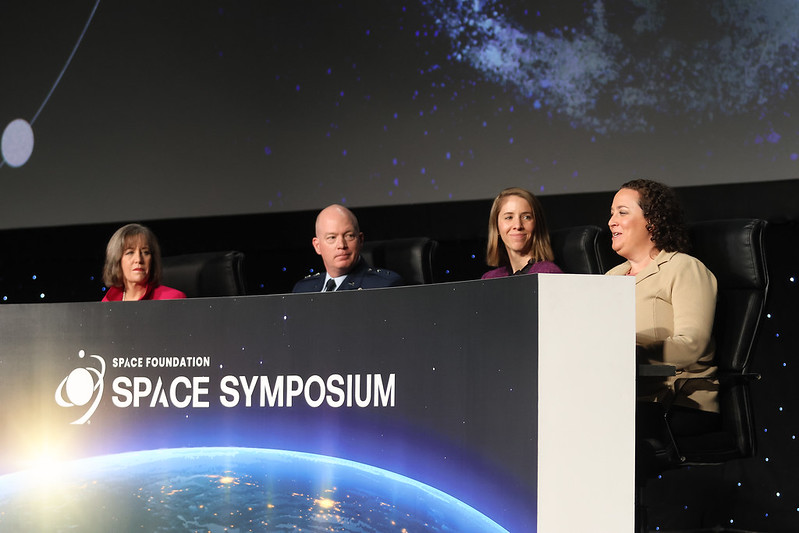Latest News
Commercial and Military Leaders Wrestle With Issues Around Commercial Protection

From left: Rebecca Cowen-Hirsch, Maj. Gen. Troy Endicott, Susanne Hake, and Audrey Schaffer. Photo: Space Foundation
COLORADO SPRINGS, Colo.—Military space domain operators are working more closely with the commercial satellite industry to not only exchange vital operational information, but also to forge ahead integrating with them, and to deal with issues around protecting commercial assets.
This comes at a time when nefarious satellite interruption activities have ticked up across the board, and are evolving. Satellite industry policy managers and space technology representatives exchanged ideas and outlooks about space domain protections with the U.S. Space Command at the Space Symposium in Colorado Springs, Colorado, on April 11.
Maj. Gen. Troy Endicott, director, Global Space Operations, U.S. Space Command, started off the discussion by putting the future integration work in perspective. “It is very clear to us and U.S. Space Command that our innovative commercial space sector is key to our nation’s resilience and strength and space,” he said. “It is absolutely foundational to our national security. This is why I think it’s really good that the department came out with a commercial space integration strategy so we can have these conversations about what it means not only for the protection of space capabilities, but also just the integration of commercial space capabilities.”
Maj. Gen. Endicott referenced the recently released Department of Defense Commercial Space Integration Strategy that outlines priorities for pursuing commercial solutions, to strengthen efforts within the department to leverage commercially-developed capabilities to meet DoD missions. Also this week, the Space Force released its first strategy for acquiring commercial space capabilities.
From an operational perspective, he said, the most important piece is to achieve integration prior to crisis. “As part of my duty in the U.S. Space Command, I must first know how we’re going to operate together before we even talk about how to protect one another. What this means is having real conversations at the operational level.”
When the commercial sector and the U.S. space command are operating together, it will help Space Command understand how to harness the speed, innovation, and advancements of the U.S. commercial space industry, he said. “These aspects give us a deterrent warfighter advantage that no other nation on the earth could match.”
Susanne Hake, general manager, U.S. Government, Maxar Intelligence, said that, from her perspective, one of the most important things to work on is information sharing. “I think it’s not just information sharing, but there’s actually a proactive component that we need to move toward,” she said. “It’s really around trust. How are these companies working closely with the government really developing a partnership? We need to have a successful model here. And it’s not just commercial-to-government. It’s commercial-to-commercial, and even commercial and government with allies as well. Figuring out those communication models is going to be really important.”
The government can provide protection using a spectrum of tools, according to Audrey Schaffer, vice president of Strategy and Policy, Slingshot Aerospace. “On one end of the spectrum, you have things that the private sector can and should do for itself,” she said. “Meeting cybersecurity standards, for example, and ensuring resilience of their networks. Those are things which the private sector can do on its own, but can be incentivized through either regulation or contracts, which is something the government has a role in.”
In the middle of the spectrum, there is information sharing, she said. “And all the way on the other end of the spectrum you have what the government could provide on its own, which are the financial mechanisms, but also the physical protection that everybody likes to talk about. We need to think of it from how government can incentivize behavior from companies to do things on their own, all the way through to where government has a more direct role.”
There are unique challenges in the satellite communications industry, which is what Rebecca Cowen-Hirsch, senior vice president, Government Strategy & Policy for Viasat, called working in “a contested environment.”
“That has been true for many years,” she said. “I don’t even recall in my career whether there was anything that was ever truly benign, if you will.”
While the cyber attack on Viasat’s KA-SAT network in Ukraine in 2022 was a highly visible example of the threats to satellites, Cowen-Hirsch said what has not been as visible is the increased evidence and increasing variety of tactics, techniques and procedures that are being used to deploy electronic warfare and electromagnetic magnetic interference. “Those are evolving over time,” she said.
The satellite communications industry is investing significantly to ensure cyber resilience, because that availability and that assurance and that trusted capability is essential. “Yet I think in this context, as we have this conversation, there’s increasing evidence and an increasing amount of electromagnetic interference. Much of it is targeted, and much of it is intentional. At what point does there need to be some intervention or some different type of information exchange?” she asked. “This is where we’re all very collaborative, to be able to exchange information with our government partners, and figure out at what point do we need to do something different.”
There is still a gap of understanding between the government and military and commercial satellite companies that is bi-directional, Cowen-Hirsch said. “Understanding what those decision-making processes are inside a company, and how they would respond under certain circumstances, and how to actually build that relationship so that you can define and understand the steps to take together to be able to operate through these environments, is integration that goes beyond information sharing,” she said.
“It must be planned, operated, tested. We must understand how those pieces come together. We’re really at the cusp of establishing better ways to do this business together.”
Get the latest Via Satellite news!
Subscribe Now